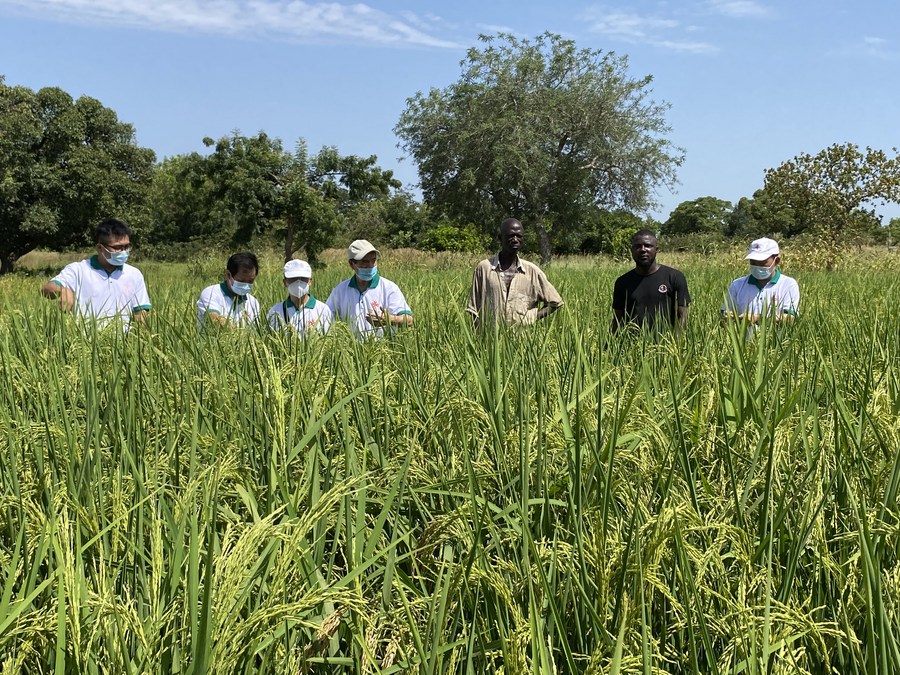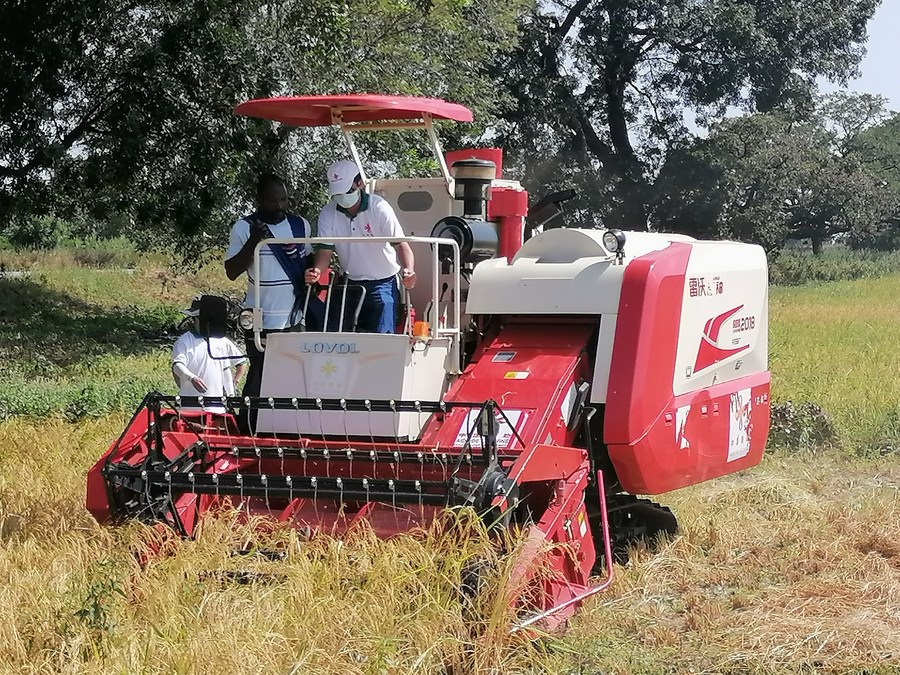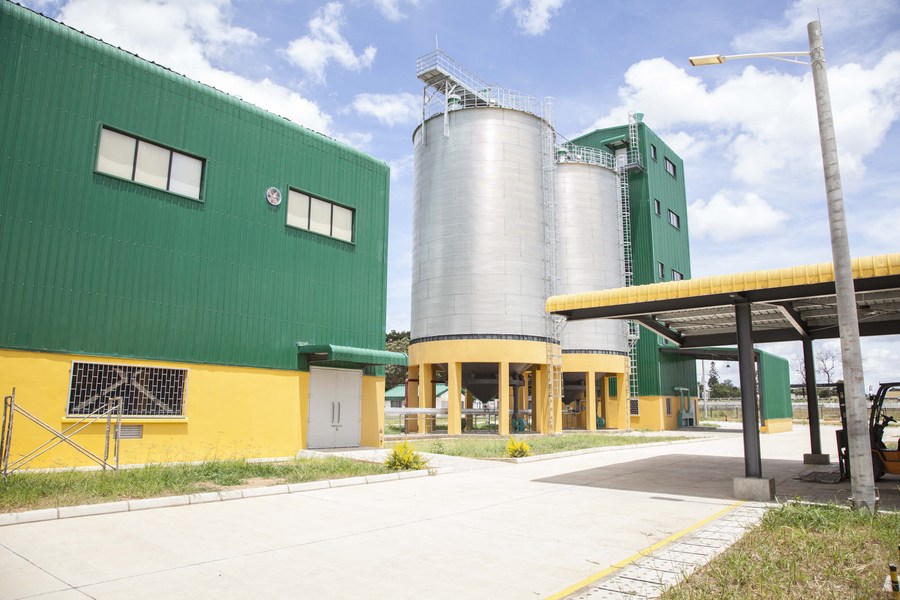
In spite of abundant resources, a large population and a vast market, Africa is still the world's least developed continent, beset by continuous poverty and hunger.
Sharing a similar underdeveloped past with Africa, China achieved its ambitious goal of eliminating extreme poverty in 2020, improving the living standards of hundreds of millions of people through decades of development.
Experts said China's conspicuous success in alleviating poverty could be of valuable guidance for Africa in its fight against poverty and pursuit of sustainable development.

Chinese experts work in a paddy field in the demonstration area of Nariou village in Burkina Faso, July 13, 2021. (Xinhua)
CHINESE MODEL OF ENDING POVERTY
In sub-Saharan Africa, most people live on less than 1.9 U.S. dollars a day, the World Bank's extreme-poverty benchmark.
According to the United Nations (UN), because of the COVID-19 pandemic, the economy of sub-Saharan Africa is expected to see serious deterioration, with an additional 26 million people living below the international poverty line.
Cavince Adhere, a Kenyan international relations expert, said that China's success in alleviating rural poverty through leveraging technology-led farming methods is an inspiration to Kenya and other developing countries.
"Contrary to many countries where development is often associated with investments in cities and other urban centers, China prioritized rural areas in its poverty reduction efforts where agriculture played a major role," Adhere said in a recent commentary.
He said that China has become the first developing country to achieve the first of the UN's 17 sustainable development goals (SDGs), adding that modern farming has hastened the realization of that feat.
"China's efforts offer good insights for Kenya's socio-economic transformation," he said.
Paul Zilungisele Tembe, a researcher at the University of South Africa's Thabo Mbeki African Leadership Institute, said China's experience is a model to the world about what is possible when there is decisive leadership, uninterrupted legal and policy continuity, bottom-up people's empowerment, solid intergovernmental relations and private sector partnerships, and leveraging contextual circumstances including geography, politics, technology.
All these factors have coalesced and translated into "poverty eradication with Chinese characteristics," said the expert, adding that "it is not inconceivable for South Africa to replicate the Chinese model of ending poverty in all its forms."

A Chinese expert helps locals in mechanized harvesting of rice in the demonstration area of Nariou village in Burkina Faso, Oct. 8, 2021. (Xinhua)
HELP FROM CHINA
"Give people fish, and you feed them for a day. Teach them how to fish, and you feed them for a lifetime." This is an old Chinese saying which best captures the essence of China's assistance to African countries.
In Burkina Faso, national rice production met only 30 percent of the population's consumption needs in 2018.
"Based on the actual needs of the Burkina Faso people, our mission is to develop rice cultivation, increase rice production, while expanding the cultivation area and promoting new technologies," said Hu Yuzhou, head of a Chinese agricultural technical assistance team in the country.
Chinese experts not only provide seeds, fertilizers and agricultural machinery, but also participate in the whole farming process.
According to Gaoussou Sanou, national coordinator of the Burkina Faso-China agricultural cooperation program, thanks to China's help, the rice output in the demonstration area of Nariou village in 2021 reached 5-6 tons per hectare, which is two to three times that of the previous year, and the quality of rice has also been significantly improved.
In Guinea-Bissau, over the past three years, experts of the 11th Chinese agri-technical team to the country, based in 13 rice production areas in the three provinces of Bafata, Gabu and Oio, have carried out "technology plus material" aid to this west-African country and achieved remarkable results.
In Madagascar, the average yield of hybrid rice produced with Chinese technologies is two to three times more than that of local ones.

Photo shows a China-aid milling plant in Lusaka, Zambia, on March 9, 2022. (Photo by Martin Mbangweta/Xinhua)
In Zambia, China-funded milling plants reduced the price of mealie meal used in making Zambia's staple food Nshima.
In Tanzania, the government has used funds from China to develop the Juncao technology for livestock fodder and mushroom production.
"The Juncao technology will increase mushroom production and consumption which will contribute to food security in the country," Tanzanian Minister for Livestock and Fisheries Mashimba Ndaki has said.
Melaku Mulualem, a senior international relations and diplomacy researcher at Ethiopia's Institute of Strategic Affairs, emphasized the need for African countries to make full use of China's technology transfer and capacity building support to Africa as a springboard to replicate its success in poverty alleviation.
Mulualem said Africa and the rest of the least developed countries should also learn from China about how to tap its human resource potential.
"Especially for least developed countries, high population can be a curse; but for China, it is an opportunity, because they are using the brain and hands of the people to innovate and produce new things," said Mulualem.
During the 8th Ministerial Conference of the Forum on China-Africa Cooperation held in late November 2021, China announced nine programs to strengthen China-Africa cooperation in such fields as poverty reduction, agricultural development and digital innovation.
Photo shows products made by a China-aid milling plant in Lusaka, Zambia, on March 9, 2022. (Photo by Martin Mbangweta/Xinhua)
A SHARED FUTURE
Commending China's poverty alleviation endeavors, the African Union (AU) Commissioner for Rural Economy and Agriculture Josefa Sacko said Africa should replicate China's success in reducing poverty, with particular emphasis on rural development.
"I had the opportunity to go to China and I saw the way they transform the rural areas into urban areas," said the commissioner.
"The Chinese practice in poverty reduction shows that high and sustained inclusive development is critical to reducing poverty," said the AU Commissioner for Trade and Industry Albert Muchanga, adding that he believes that poverty reduction in Africa also requires the same strong political commitment and will as China has demonstrated.
According to Muchanga, one of the key elements that African countries can learn from China's extraordinary experience in ending extreme poverty is the establishment of township industries where poverty was most pronounced.
Chinese experts help locals in mechanized harvesting of rice in the demonstration area of Nariou village in Burkina Faso, Oct. 8, 2021. (Xinhua)
Muchanga highlighted the AU's keen intent to partner with China in realizing the targeted average annual growth of over 7 percent set by the AU's Agenda 2063, noting that it is also necessary to learn from China's sustainable eco-friendly development endeavors.
"Sustainable development simply means development without compromising the environment. When China comes to the second position in global economy, it is not by compromising the environment. So, the experience of China is helpful for Africa to alleviate poverty and drought," Muchanga stressed.
China's initiative to build a community with a shared future for mankind has the potential to significantly reduce poverty in Africa and elsewhere across the developing world, Mulualem said.
"Shared future means to think about the people of the world at large," said Mulualem, adding that "Africa can also benefit from this shared future vision."